- Home
- George Orwell
Fifty Orwell Essays Page 14
Fifty Orwell Essays Read online
Page 14
thrashes them, reciting Dr. Watts's 'Let dogs delight to bark and bite'
between blows of the cane, and then takes them to spend the afternoon
beneath a gibbet where the rotting corpse of a murderer is hanging. In
the earlier part of the century scores of thousands of children, aged
sometimes as young as six, were literally worked to death in the mines
or cotton mills, and even at the fashionable public schools boys were
flogged till they ran with blood for a mistake in their Latin verses.
One thing which Dickens seems to have recognized, and which most of his
contemporaries did not, is the sadistic sexual element in flogging. I
think this can be inferred from DAVID COPPERFIELD and NICHOLAS NICKLEBY.
But mental cruelty to a child infuriates him as much as physical, and
though there is a fair number of exceptions, his schoolmasters are
generally scoundrels.
Except for the universities and the big public schools, every kind of
education then existing in England gets a mauling at Dickens's hands.
There is Doctor Blimber's Academy, where little boys are blown up with
Greek until they burst, and the revolting charity schools of the period,
which produced specimens like Noah Claypole and Uriah Heep, and Salem
House, and Dotheboys Hall, and the disgraceful little dame-school kept by
Mr. Wopsle's great-aunt. Some of what Dickens says remains true even
today. Salem House is the ancestor of the modern 'prep school', which
still has a good deal of resemblance to it; and as for Mr. Wopsle's
great-aunt, some old fraud of much the same stamp is carrying on at this
moment in nearly every small town in England. But, as usual, Dickens's
criticism is neither creative nor destructive. He sees the idiocy of an
educational system founded on the Greek lexicon and the wax-ended cane;
on the other hand, he has no use for the new kind of school that is
coming up in the fifties and sixties, the 'modern' school, with its
gritty insistence on 'facts'. What, then, DOES he want? As always, what
he appears to want is a moralized version of the existing thing--the old
type of school, but with no caning, no bullying or underfeeding, and not
quite so much Greek. Doctor Strong's school, to which David Copperfield
goes after he escapes from Murdstone & Grinby's, is simply Salem House
with the vices left out and a good deal of 'old grey stones' atmosphere
thrown in:
Doctor Strong's was an excellent school, as different from Mr. Creakle's
as good is from evil. It was very gravely and decorously ordered, and on
a sound system; with an appeal, in everything, to the honour and good
faith of the boys...which worked wonders. We all felt that we had a part
in the management of the place, and in sustaining its character and
dignity. Hence, we soon became warmly attached to it--I am sure I did
for one, and I never knew, in all my time, of any boy being
otherwise--and learnt with a good will, desiring to do it credit. We had
noble games out of hours, and plenty of liberty; but even then, as I
remember, we were well spoken of in the town, and rarely did any
disgrace, by our appearance or manner, to the reputation of Doctor
Strong and Doctor Strong's boys.
In the woolly vagueness of this passage one can see Dickens's utter lack
of any educational theory. He can imagine the MORAL atmosphere of a good
school, but nothing further. The boys 'learnt with a good will', but what
did they learn? No doubt it was Doctor Blimber's curriculum, a little
watered down. Considering the attitude to society that is everywhere
implied in Dickens's novels, it comes as rather a shock to learn that he
sent his eldest son to Eton and sent all his children through the
ordinary educational mill. Gissing seems to think that he may have done
this because he was painfully conscious of being under-educated himself.
Here perhaps Gissing is influenced by his own love of classical learning.
Dickens had had little or no formal education, but he lost nothing by
missing it, and on the whole he seems to have been aware of this. If he
was unable to imagine a better school than Doctor Strong's, or, in real
life, than Eton, it was probably due to an intellectual deficiency rather
different from the one Gissing suggests.
It seems that in every attack Dickens makes upon society he is always
pointing to a change of spirit rather than a change of structure. It is
hopeless to try and pin him down to any definite remedy, still more to
any political doctrine. His approach is always along the moral plane, and
his attitude is sufficiently summed up in that remark about Strong's
school being as different from Creakle's 'as good is from evil'. Two
things can be very much alike and yet abysmally different. Heaven and
Hell are in the same place. Useless to change institutions without a
'change of heart'--that, essentially, is what he is always saying.
If that were all, he might be no more than a cheer-up writer, a
reactionary humbug. A 'change of heart' is in fact THE alibi of people
who do not wish to endanger the STATUS QUO. But Dickens is not a humbug,
except in minor matters, and the strongest single impression one carries
away from his books is that of a hatred of tyranny. I said earlier that
Dickens is not IN THE ACCEPTED SENSE a revolutionary writer. But it is
not at all certain that a merely moral criticism of society may not be
just as 'revolutionary'--and revolution, after all, means turning things
upside down--as the politico-economic criticism which is fashionable at
this moment. Blake was not a politician, but there is more understanding
of the nature of capitalist society in a poem like 'I wander through each
charted street' than in three-quarters of Socialist literature. Progress
is not an illusion, it happens, but it is slow and invariably
disappointing. There is always a new tyrant waiting to take over from the
old--generally not quite so bad, but still a tyrant. Consequently two
viewpoints are always tenable. The one, how can you improve human nature
until you have changed the system? The other, what is the use of changing
the system before you have improved human nature? They appeal to
different individuals, and they probably show a tendency to alternate in
point of time. The moralist and the revolutionary are constantly
undermining one another. Marx exploded a hundred tons of dynamite beneath
the moralist position, and we are still living in the echo of that
tremendous crash. But already, somewhere or other, the sappers are at
work and fresh dynamite is being tamped in place to blow Marx at the
moon. Then Marx, or somebody like him, will come back with yet more
dynamite, and so the process continues, to an end we cannot yet foresee.
The central problem--how to prevent power from being abused--remains
unsolved. Dickens, who had not the vision to see that private property is
an obstructive nuisance, had the vision to see that. 'If men would behave
decently the world would be decent' is not such a platitude as it sounds.
II
More completely than most writers, perhaps, Dickens can be explained in
; terms of his social origin, though actually his family history was not
quite what one would infer from his novels. His father was a clerk in
government service, and through his mother's family he had connexions
with both the Army and the Navy. But from the age of nine onwards he was
brought up in London in commercial surroundings, and generally in an
atmosphere of struggling poverty. Mentally he belongs to the small urban
bourgeoisie, and he happens to be an exceptionally fine specimen of this
class, with all the 'points', as it were, very highly developed. That is
partly what makes him so interesting. If one wants a modern equivalent,
the nearest would be H. G. Wells, who has had a rather similar history
and who obviously owes something to Dickens as novelist. Arnold Bennett
was essentially of the same type, but, unlike the other two, he was a
midlander, with an industrial and noncomformist rather than commercial
and Anglican background.
The great disadvantage, and advantage, of the small urban bourgeois is
his limited outlook. He sees the world as a middle-class world, and
everything outside these limits is either laughable or slightly wicked.
On the one hand, he has no contact with industry or the soil; on the
other, no contact with the governing classes. Anyone who has studied
Wells's novels in detail will have noticed that though he hates the
aristocrat like poison, he has no particular objection to the plutocrat,
and no enthusiasm for the proletarian. His most hated types, the people
he believes to be responsible for all human ills, are kings, landowners,
priests, nationalists, soldiers, scholars and peasants. At first sight a
list beginning with kings and ending with peasants looks like a mere
omnium gatherum, but in reality all these people have a common factor.
All of them are archaic types, people who are governed by tradition and
whose eyes are turned towards the past--the opposite, therefore, of the
rising bourgeois who has put his money on the future and sees the past
simply as a dead hand.
Actually, although Dickens lived in a period when the bourgeoisie was
really a rising class, he displays this characteristic less strongly than
Wells. He is almost unconscious of the future and has a rather sloppy
love of the picturesque (the 'quaint old church', etc.). Nevertheless his
list of most hated types is like enough to Wells's for the similarity to
be striking. He is vaguely on the side of the working class--has a sort
of generalized sympathy with them because they are oppressed--but he
does not in reality know much about them; they come into his books
chiefly as servants, and comic servants at that. At the other end of the
scale he loathes the aristocrat and--going one better than Wells in this
loathes the big bourgeois as well. His real sympathies are bounded by Mr.
Pickwick on the upper side and Mr. Barkis on the lower. But the term
'aristocrat', for the type Dickens hates, is vague and needs defining.
Actually Dickens's target is not so much the great aristocracy, who
hardly enter into his books, as their petty offshoots, the cadging
dowagers who live up mews in Mayfair, and the bureaucrats and
professional soldiers. All through his books there are countess hostile
sketches of these people, and hardly any that are friendly. There are
practically no friendly pictures of the landowning class, for instance.
One might make a doubtful exception of Sir Leicester Dedlock; otherwise
there is only Mr. Wardle (who is a stock figure the 'good old squire')
and Haredale in BARNABY RUDGE, who has Dickens's sympathy because he is a
persecuted Catholic. There are no friendly pictures of soldiers (i.e.
officers), and none at all of naval men. As for his bureaucrats, judges
and magistrates, most of them would feel quite at home in the
Circumlocution Office. The only officials whom Dickens handles with any
kind of friendliness are, significantly enough, policemen.
Dickens's attitude is easily intelligible to an Englishman, because it is
part of the English puritan tradition, which is not dead even at this
day. The class Dickens belonged to, at least by adoption, was growing
suddenly rich after a couple of centuries of obscurity. It had grown up
mainly in the big towns, out of contact with agriculture, and politically
impotent; government, in its experience, was something which either
interfered or persecuted. Consequently it was a class with no tradition
of public service and not much tradition of usefulness. What now strikes
us as remarkable about the new moneyed class of the nineteenth century is
their complete irresponsibility; they see everything in terms of
individual success, with hardly any consciousness that the community
exists. On the other hand, a Tite Barnacle, even when he was neglecting
his duties, would have some vague notion of what duties he was
neglecting. Dickens's attitude is never irresponsible, still less does he
take the money-grubbing Smilesian line; but at the back of his mind there
is usually a half-belief that the whole apparatus of government is
unnecessary. Parliament is simply Lord Coodle and Sir Thomas Doodle, the
Empire is simply Major Bagstock and his Indian servant, the Army is
simply Colonel Chowser and Doctor Slammer, the public services are simply
Bumble and the Circumlocution Office--and so on and so forth. What he
does not see, or only intermittently sees, is that Coodle and Doodle and
all the other corpses left over from the eighteenth century ARE
performing a function which neither Pickwick nor Boffin would ever bother
about.
And of course this narrowness of vision is in one way a great advantage
to him, because it is fatal for a caricaturist to see too much. From
Dickens's point of view 'good' society is simply a collection of village
idiots. What a crew! Lady Tippins! Mrs. Gowan! Lord Verisopht! The
Honourable Bob Stables! Mrs. Sparsit (whose husband was a Powler)! The
Tite Barnacles! Nupkins! It is practically a case-book in lunacy. But at
the same time his remoteness from the landowning-military-bureaucratic
class incapacitates him for full-length satire. He only succeeds with
this class when he depicts them as mental defectives. The accusation
which used to be made against Dickens in his lifetime, that he 'could not
paint a gentleman', was an absurdity, but it is true in this sense, that
what he says against the 'gentleman' class is seldom very damaging. Sir
Mulberry Hawk, for instance, is a wretched attempt at the wicked-baronet
type. Harthouse in HARD TIMES is better, but he would be only an ordinary
achievement for Trollope or Thackeray. Trollope's thoughts hardly move
outside the 'gentleman' class, but Thackeray has the great advantage of
having a foot in two moral camps. In some ways his outlook is very
similar to Dickens's. Like Dickens, he identifies with the puritanical
moneyed class against the card-playing, debt-bilking aristocracy. The
eighteenth century, as he sees it, is sticking out into the nineteenth in
the person of the wicked Lord Steyne. VANITY FAIR is a full-length
ve
rsion of what Dickens did for a few chapters in LITTLE DORRIT. But by
origins and upbringing Thackeray happens to be somewhat nearer to the
class he is satirizing. Consequently he can produce such comparatively
subtle types as, for instance, Major Pendennis and Rawdon Crawley. Major
Pendennis is a shallow old snob, and Rawdon Crawley is a thick-headed
ruffian who sees nothing wrong in living for years by swindling
tradesmen; but what Thackery realizes is that according to their tortuous
code they are neither of them bad men. Major Pendennis would not sign a
dud cheque, for instance; Rawdon certainly would, but on the other hand
he would not desert a friend in a tight corner. Both of them would behave
well on the field of battle--a thing that would not particularly appeal
to Dickens. The result is that at the end one is left with a kind of
amused tolerance for Major Pendennis and with something approaching
respect for Rawdon; and yet one sees, better than any diatribe could make
one, the utter rottenness of that kind of cadging, toadying life on the
fringes of smart society. Dickens would be quite incapable of this. In
his hands both Rawdon and the Major would dwindle to traditional
caricatures. And, on the whole, his attacks on 'good' society are rather
perfunctory. The aristocracy and the big bourgeoisie exist in his books
chiefly as a kind of 'noises off', a haw-hawing chorus somewhere in the
wings, like Podsnap's dinner-parties. When he produces a really subtle
and damaging portrait, like John Dorrit or Harold Skimpole, it is
generally of some rather middling, unimportant person.
One very striking thing about Dickens, especially considering the time he
lived in, is his lack of vulgar nationalism. All peoples who have reached
the point of becoming nations tend to despise foreigners, but there is
not much doubt that the English-speaking races are the worst offenders.
One can see this from the fact that as soon as they become fully aware of
any foreign race they invent an insulting nickname for it. Wop, Dago,
Froggy, Squarehead, Kike, Sheeny, Nigger, Wog, Chink, Greaser,
Yellowbelly--these are merely a selection. Any time before 1870 the list
would have been shorter, because the map of the world was different from
what it is now, and there were only three or four foreign races that had
fully entered into the English consciousness. But towards these, and
especially towards France, the nearest and best-hated nation, the English
attitude of patronage was so intolerable that English 'arrogance' and
'xenophobia' are still a legend. And of course they are not a completely
untrue legend even now. Till very recently nearly all English children
were brought up to despise the southern European races, and history as
taught in schools was mainly a list of battles won by England. But one
has got to read, say, the QUARTERLY REVIEW of the thirties to know what
boasting really is. Those were the days when the English built up their
legend of themselves as 'sturdy islanders' and 'stubborn hearts of oak'
and when it was accepted as a kind of scientific fact that one Englishman
was the equal of three foreigners. All through nineteenth-century novels
and comic papers there runs the traditional figure of the 'Froggy'--a
small ridiculous man with a tiny beard and a pointed top-hat, always
jabbering and gesticulating, vain, frivolous and fond of boasting of his
martial exploits, but generally taking to flight when real danger
appears. Over against him was John Bull, the 'sturdy English yeoman', or
(a more public-school version) the 'strong, silent Englishman' of Charles
Kingsley, Tom Hughes and others.
Thackeray, for instance, has this outlook very strongly, though there are
moments when he sees through it and laughs at it. The one historical fact
that is firmly fixed in his mind is that the English won the battle of
Waterloo. One never reads far in his books without coming upon some

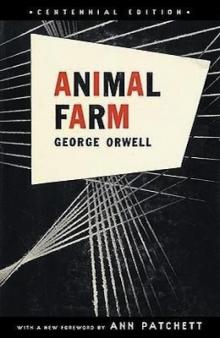 Animal Farm & 1984
Animal Farm & 1984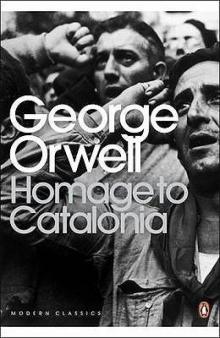 Homage to Catalonia
Homage to Catalonia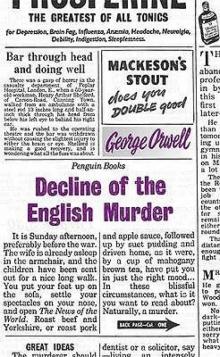 Decline of the English Murder
Decline of the English Murder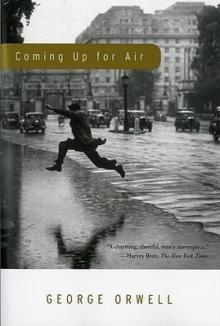 Coming Up for Air
Coming Up for Air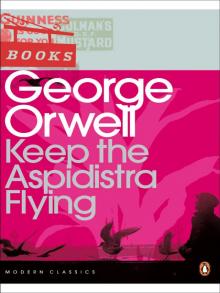 Keep the Aspidistra Flying
Keep the Aspidistra Flying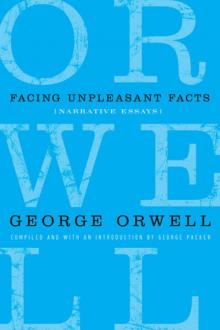 Facing Unpleasant Facts: Narrative Essays
Facing Unpleasant Facts: Narrative Essays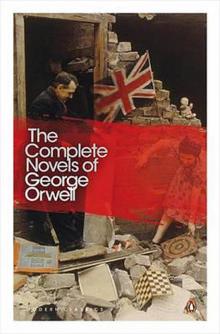 The Complete Novels of George Orwell
The Complete Novels of George Orwell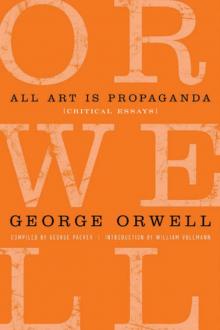 All Art Is Propaganda: Critical Essays
All Art Is Propaganda: Critical Essays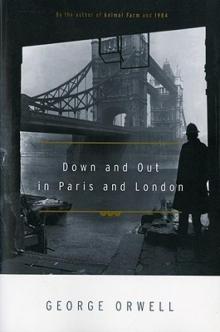 Down and Out in Paris and London
Down and Out in Paris and London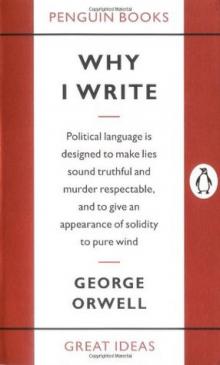 Why I Write
Why I Write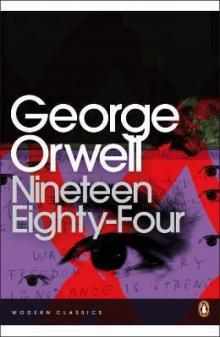 Nineteen Eighty-Four
Nineteen Eighty-Four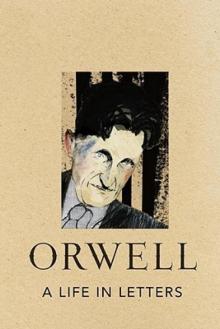 A Life in Letters
A Life in Letters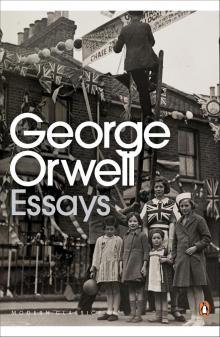 Essays
Essays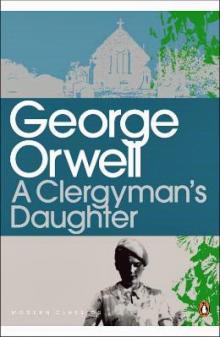 A Clergyman's Daughter
A Clergyman's Daughter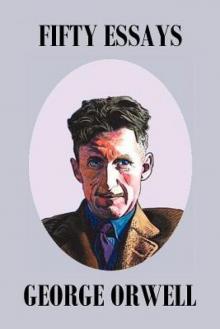 Fifty Orwell Essays
Fifty Orwell Essays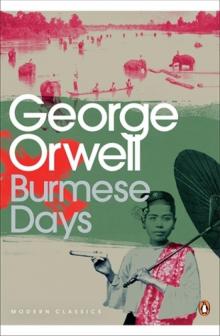 Burmese Days
Burmese Days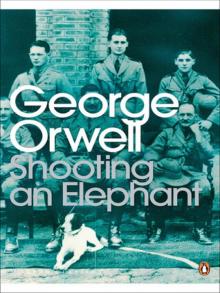 Shooting an Elephant
Shooting an Elephant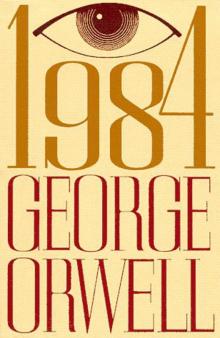 1984 (Penguin)
1984 (Penguin)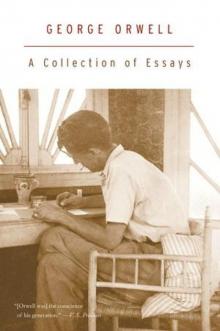 A Collection of Essays
A Collection of Essays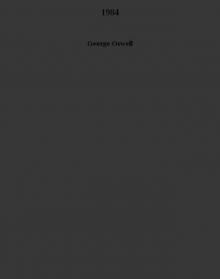 1984
1984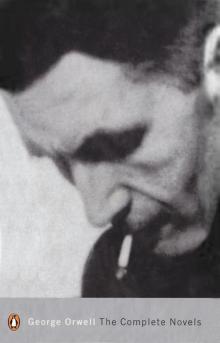 The Complete Novels
The Complete Novels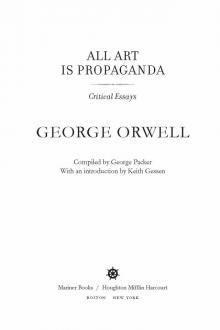 All Art Is Propaganda
All Art Is Propaganda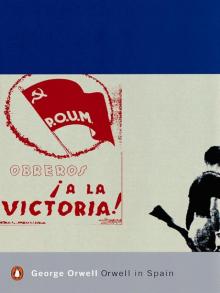 Orwell in Spain
Orwell in Spain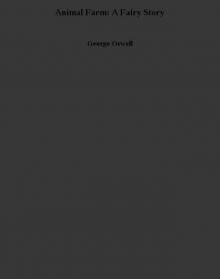 Animal Farm: A Fairy Story
Animal Farm: A Fairy Story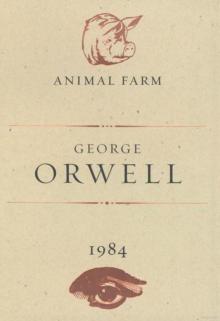 Animal Farm and 1984
Animal Farm and 1984